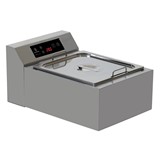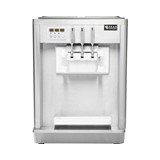Proper maintenance is the cornerstone of ensuring the longevity and performance of commercial coffee machines.
In this comprehensive guide, we will explore the intricacies of maintaining these essential pieces of equipment.
Our aim is to provide you with a professional, objective, and informative resource that will assist you in caring for your commercial coffee machine effectively.
Why Maintenance Matters:
Commercial coffee machines are the workhorses of coffee shops, restaurants, and cafes, consistently churning out the perfect brew. However, their reliability and quality can only be sustained through meticulous maintenance.
Neglecting maintenance can lead to a host of issues, including reduced coffee quality, increased downtime, and costly repairs or replacements.
This guide is designed to equip you with the knowledge and techniques necessary to keep your commercial coffee machine running at its best, ensuring that your customers always enjoy a perfect cup of coffee.
I. Daily Cleaning Routine: Keeping Your Machine in Top Hygienic Condition
A. The Significance of Daily Cleaning
- Maintaining hygiene is paramount in a commercial coffee environment.
- Daily cleaning prevents the buildup of coffee residues, oils, and bacteria.
- Enhances the taste and quality of the coffee served to customers.
- Prolongs the lifespan of the coffee machine and reduces downtime.
- Ensures compliance with health and safety regulations, safeguarding both staff and customers.
B. Step-by-Step Guide for Daily Cleaning
- Switch Off and Unplug: Before cleaning, ensure the machine is switched off and unplugged to avoid accidents.
- Empty Coffee Grounds: Remove and dispose of used coffee grounds and any leftover coffee.
- Remove Drip Trays and Grates: Take out drip trays and grates for separate cleaning.
- Clean Drip Trays and Grates: Wash these components with warm soapy water, rinse thoroughly, and let them air dry.
- Wipe Down External Surfaces: Use a damp cloth to wipe the machine's exterior, removing any spills or splatters.
- Clean Coffee Spouts: Pay attention to coffee spouts; use a brush to dislodge any stuck coffee grounds.
- Empty and Clean the Drip Tray: Ensure the drip tray is emptied, cleaned, and dried before reassembly.
- Check Water Reservoir: If your machine has a water reservoir, empty and rinse it daily.
- Check the Coffee Bean Hopper: For machines with a bean hopper, ensure it is clean and free from debris.
- Run a Water Rinse: Some machines have an automatic rinse cycle; run this cycle daily if available.
C. Recommended Cleaning Agents and Tools
- Mild Detergent: Use a mild, non-abrasive detergent for cleaning external surfaces and removable parts.
- Coffee Machine Cleaning Tablets: Some machines benefit from specialized cleaning tablets; refer to your machine's manual.
- Soft Brushes: Invest in soft brushes or specialized coffee machine cleaning brushes for nooks and crannies.
- Microfiber Cloths: These are ideal for wiping down surfaces without leaving lint or scratches.
- Sanitizing Solution: Consider a food-safe sanitizing solution for periodic deep cleaning and disinfection.
- Rubber Gloves: To protect your hands from hot surfaces and cleaning agents.
II. Decalcification: Preventing Scale Buildup and Equipment Damage
Decalcification is a critical aspect of maintaining your commercial coffee machine, as it directly addresses one of the most common and potentially damaging issues: scale buildup. This section will delve into the understanding of scale buildup, the recommended frequency and methods of decalcification, and the significant role that water quality plays in preventing scale-related complications.
A. Understanding Scale Buildup and Its Consequences
- Scale, the Silent Culprit: Scale, often referred to as limescale or mineral deposits, is a result of the minerals found in water (primarily calcium and magnesium) accumulating over time on the internal components of your coffee machine.
- Effects on Performance: Scale can gradually clog pipes, valves, and heating elements, reducing water flow and interfering with the machine's ability to reach and maintain the ideal brewing temperature. This not only impacts the quality of your coffee but also the longevity of your equipment.
- Energy Inefficiency: Coffee machines encrusted with scale are less energy-efficient. It requires more power to heat water when scale insulates the heating elements. This translates to higher energy bills and increased wear and tear on your machine.
B. Frequency and Methods of Decalcification
- Frequency Matters: The frequency of decalcification largely depends on the hardness of the water in your area and how intensively your coffee machine is used. A general guideline is to decalcify your machine every 1 to 3 months.
- Methods of Decalcification: There are two primary methods for decalcifying your commercial coffee machine:
- Chemical Solutions: Commercially available descaling solutions are designed to dissolve scale efficiently. Always follow the manufacturer's instructions and make sure the solution is fully flushed from the system to prevent contamination.
- Citric Acid or Vinegar: A more natural alternative involves using a solution of citric acid or vinegar and water. Again, it's crucial to rinse thoroughly to remove any residual taste or odor.
C. Importance of Using Quality Water in Preventing Scale
- The Water Source: The quality of water you use in your coffee machine plays a pivotal role in scale prevention. Hard water, characterized by high mineral content, is more likely to lead to scale buildup.
- Water Filtration: Consider investing in a water filtration system. These systems remove impurities and minerals from the water, reducing the risk of scale formation. Regularly maintain and replace filters as recommended by the manufacturer.
- Monitoring and Testing: Periodically test your water's hardness using readily available water hardness test kits. This will help you determine the appropriate frequency of decalcification and the effectiveness of your filtration system.
V. Water Quality Management: Protecting Your Machine from Impurities
A. The impact of water quality on coffee machine performance
- Crucial Role: The quality of water used in your commercial coffee machine plays a pivotal role in its overall performance and longevity.
- Taste and Aroma: Poor water quality can significantly affect the taste and aroma of your coffee, leading to a less satisfying brew.
- Scale Buildup: Low-quality water often contains minerals that can accumulate inside the machine, causing scale buildup. This scale can clog pipes and heating elements, reducing efficiency.
- Espresso Machines: Espresso machines, in particular, are sensitive to water quality. Even minor impurities can alter the pressure and temperature, resulting in inconsistent shots.
- Long-Term Damage: Over time, using low-quality water can lead to costly repairs and premature machine failure.
B. Water filtration systems and their benefits
- Invest in Filtration: To counter the negative effects of poor water quality, consider investing in a water filtration system designed for commercial coffee machines.
- Removal of Impurities: These systems effectively remove impurities such as chlorine, sediment, minerals, and odors from the water, ensuring it's clean and suitable for brewing.
- Consistency: Filtered water provides a consistent and stable environment for your coffee machine, enhancing the quality of each cup.
- Extended Lifespan: By reducing scale buildup, filtration systems help prolong the lifespan of your machine, ultimately saving you money on repairs and replacements.
C. Maintaining the water reservoir and lines
- Regular Cleaning: To maintain water quality, it's essential to regularly clean the water reservoir and the lines connecting it to the coffee machine.
- Weekly Rinse: Perform a weekly rinse of the water reservoir with a mild detergent to remove any residue or impurities that may accumulate.
- Sanitization: Periodically, use a sanitizing solution recommended by your machine's manufacturer to ensure the water system remains hygienic.
- Inspect Hoses: Inspect the hoses and lines for any signs of wear, leaks, or clogs. Replace damaged components promptly to prevent contamination.
- Empty the Reservoir: If the coffee machine will be unused for an extended period, empty the water reservoir to prevent stagnation and bacterial growth
Conclusion:
As we conclude this comprehensive maintenance guide for commercial coffee machines, let's recap the key takeaways from each section. It's imperative to emphasize the critical importance of regular maintenance for these machines and maintain the informative and professional tone throughout the article.


-160x160-state_article-rel-cat.png)



-160x160-state_article-rel-cat.png)




-160x160-state_article-rel-cat.png)















